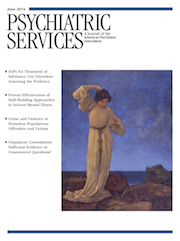Financial Health and Social Recovery
Being poor increases the likelihood that a person will have a mental illness, exacerbates psychiatric symptoms, and increases the likelihood of poor general medical health. Benefits counseling and supportive employment can have a positive impact on an individual’s financial instability and related anxiety by directly increasing income. Having a conservator or representative payee can also lead to positive outcomes for those who make bad financial decisions. However, interventions that remove financial control from clients rarely incorporate either their input regarding entry into such arrangements or plans for clients’ eventual exit.
Recently, “financial health” interventions that entail financial literacy training and asset-building support, including Individual Development Account (IDA) programs and links to banking services, have been introduced in mental health care with the goal of helping participants become more financially stable and secure while managing their own money. These interventions build on two decades of experience with microfinance interventions for persons living in poverty in the United States.
Although the incorporation of financial health and microfinance interventions in mental health care is promising, we must carefully consider two related issues in regard to adoption of these interventions. First, recognition of the limits of microfinance in alleviating poverty will help us take maximum advantage of its potential in mental health care. For example, research shows that financial literacy training has little impact unless it is linked with immediately actionable next steps, such as on-the-spot enrollment in an automatic savings plan; that the poorest and most vulnerable groups struggle most to benefit from IDAs; and that programs linking vulnerable groups with banks often founder because of the high costs associated with meeting the needs of these groups and the absence of financial gain for the banks. Second, potential impacts of financial health interventions are most likely to be achieved if they are explicitly linked to broad social recovery approaches that promote social inclusion, capabilities, and citizenship. We hypothesize—pending research on this topic—that individual efforts, such as opening bank accounts, making regular savings deposits, and establishing good financial habits, will be more effective and better sustained when they occur in the context of efforts to build stronger social networks and achieve valued roles.
A social recovery foundation may also promote improved income earning and asset building. Embedding financial health in a social recovery framework may help people understand the socioeconomic conditions that shape their individual struggles with poverty, which may reduce the burden of a sense of personal failure that they may carry and, at the same time, empower them with practical steps to take toward personal financial stability.



